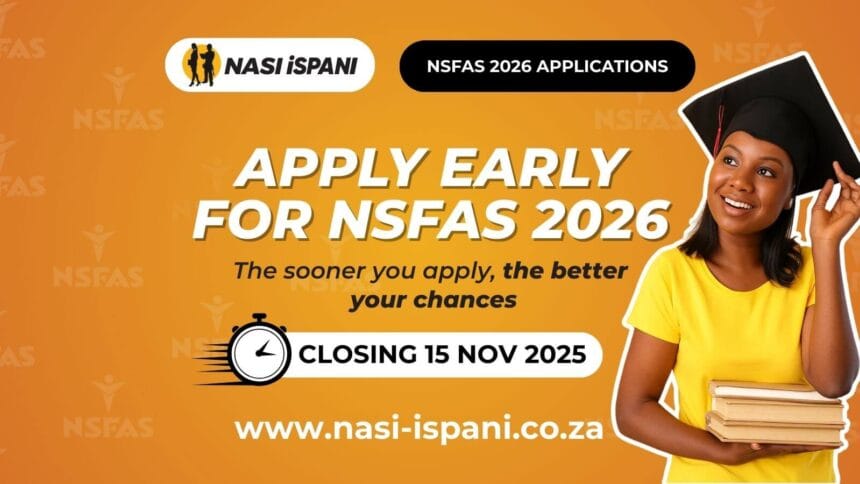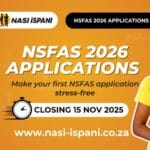If you’re thinking about applying for financial aid in 2026, one question is probably top of mind: “Do I even qualify for NSFAS?”
- NSFAS 2026 Eligibility Requirements
- South African Citizenship
- Household Income Threshold
- Public Institution Enrollment
- Academic Requirements
- SASSA Grant Recipients
- Special Case: Students with Disabilities
- Optional Eligibility Factors and Exceptions
- Who Does NOT Qualify for NSFAS 2026
- Unsure About Your Eligibility?
- Quick NSFAS Eligibility Checklist
That’s exactly what we’re here to help you figure out. In this article, we’re going to focus specifically on NSFAS 2026 requirements and break down who can and who can’t apply.
We won’t get into the long lists of documents or step-by-step application guides just yet; those will be part of our NSFAS 2026 information series. Instead, our goal is simple: to give you a clear, easy-to-understand picture of who qualifies for NSFAS 2026, so you can check your eligibility early and save yourself the stress later.
NSFAS 2026 Eligibility Requirements
Understanding the core eligibility requirements for NSFAS 2026 is the first step in knowing whether you stand a chance of securing funding. Let’s break down each requirement in detail, so you can see if you meet the key criteria before you start your application.
South African Citizenship
Requirement: Must be a South African citizen.
Types of status:
- South African citizen: Born in SA or naturalized; eligible for NSFAS.
- Permanent resident: Holds permanent residency status → not eligible.
- International student: Foreign nationality → not eligible.
How to prove citizenship:
- Valid ID book or smart ID (primary proof)
- Birth certificate or citizenship certificate (if naturalized)
- Passport showing South African citizenship
New applicants:
- Must provide proof of SA citizenship when applying.
Returning students:
- NSFAS already has your citizenship status on file; ensure ID or documents are still valid.
Tips:
- Permanent residents or international students should explore other bursaries or scholarships.
- Make sure your ID details match your application exactly.
Household Income Threshold
NSFAS assesses household income to ensure funding goes to students who genuinely need support.
Income limits:
- Standard: R350,000/year
- Students with disabilities: R600,000/year
How income is measured:
- Includes wages, salaries, bonuses, pensions, rental income, and certain allowances of parents, guardians, or spouse
- Household income is measured as the total combined income of all contributing members living in the household.
Special scenarios:
- If your parents do not work but a sibling (e.g., older brother) is the main breadwinner: Yes, his income counts toward the household total.
- You do not need to provide income statements for every household member yourself—only for those contributing financially. NSFAS may request documentation for verification.
New applicants:
- Submit proof of household income for parents/guardians or spouses.
- Accurate reporting is critical to avoid delays or rejections.
Returning students:
- Must confirm income has not exceeded the threshold since last application.
- If household circumstances have changed (e.g., a new breadwinner), update NSFAS with the latest income statements.
Tips:
- Collect pay slips, tax returns, or official letters to verify income.
- Be transparent: NSFAS verifies income through multiple sources.
Learn more: How Household Income is Calculated for NSFAS
Public Institution Enrollment
Requirement: Must be enrolled or planning to enroll in a public university or TVET college in South Africa.
“First undergraduate qualification” explained:
- NSFAS primarily funds students pursuing their first diploma or degree.
- If you previously completed a short course or certificate (even from a private institution), you are still eligible to apply for a first undergraduate diploma or degree at a public institution.
- Postgraduate qualifications are generally excluded (unless approved by NSFAS).
New applicants:
- Must show enrollment confirmation or acceptance letter from a public institution.
- Only first undergraduate studies are funded.
Returning students:
- Must already be enrolled in a public institution for their undergraduate program.
- NSFAS may verify that the program is still considered undergraduate.
Tips:
- If transferring from a private certificate to a public diploma, you can still apply as long as it’s your first undergraduate-level study.
- Always check that your intended program is recognized by NSFAS.
Academic Requirements
NSFAS considers academic performance to ensure that funding supports committed students.
First-time applicants (new students):
- Must meet the minimum admission criteria for the program (usually an NSC pass with required points).
- Example: National Senior Certificate (NSC) pass and required points for the intended course.
Returning students:
- Must pass at least 50% of modules in the previous year.
- Must comply with the N+1 rule: one extra year beyond the standard program duration to complete the qualification.
- Example: 3-year degree → must finish in 4 years.
Special scenarios:
- Transferring from TVET college to university: Your marks/academic performance at TVET are considered to check eligibility for funding at the new institution.
- Improved marks after a year without funding: Yes, NSFAS considers returning students for the next funding cycle if performance improves and they meet academic criteria.
Tips:
- Keep all academic records and module passes updated.
- Know your institution’s minimum passing percentages to remain eligible.
SASSA Grant Recipients
Students from families receiving SASSA grants may qualify automatically for NSFAS, whether new or returning applicants.
Qualifying grants:
- Child Support Grant
- Disability Grant
- Foster Child Grant
New applicants:
- Can use the SASSA grant as proof of financial need during their first application.
Returning students:
- Must still verify SASSA grant status each year for renewal.
Tips:
- Link your application to your SASSA grant reference number.
- Ensure all grant details are current to avoid delays.
Special Case: Students with Disabilities
Students with disabilities have specific eligibility considerations:
Requirements:
- Higher household income threshold: R600,000/year
- Must submit Disability Annexure A form
Additional NSFAS support:
- Assistive devices (e.g., screen readers, braille devices)
- Learning aids (e.g., adapted textbooks)
- Transport support if required
New applicants:
- Submit Annexure A with all supporting medical or assessment documents.
Returning students:
- Confirm that all previous documentation is still valid.
- Update NSFAS if your needs have changed or require additional support.
Example scenario:
- Thandi, visually impaired, applies under the higher threshold and submits Annexure A → qualifies for tailored support.
Tips:
- Accurate completion of Annexure A ensures full access to all available support.
- Early submission allows NSFAS to allocate resources from the start of your studies.
Optional Eligibility Factors and Exceptions
In addition to the core requirements, NSFAS also considers some optional eligibility factors and special circumstances that may allow you to qualify even if certain conditions are borderline. These are not guaranteed but can help students access funding.
Students with Special Circumstances
Some students may face challenges that affect their household income, academic performance, or access to education. NSFAS can consider these on a case-by-case basis.
Examples include:
- Orphans or children from child-headed households
- Students who are dependents of unemployed parents
- Families experiencing sudden financial hardship
New applicants:
- Must provide supporting documentation (e.g., death certificate, social worker letter, proof of unemployment).
- NSFAS will assess eligibility under special circumstances if household income appears high but the student is still dependent.
Returning students:
- Can update NSFAS with any new changes in household circumstances to be considered for continued funding.
- Supporting documents may need renewal if circumstances change year-to-year.
Tip:
- Always include a short explanatory letter detailing your situation for clarity.
Students from Rural or Underprivileged Areas
- NSFAS recognizes that students from rural or under-resourced areas may face additional financial challenges.
- While this does not automatically grant eligibility, it may be considered if household income is borderline.
New applicants:
- Must provide proof of residence in rural or disadvantaged area (e.g., utility bill, affidavit, municipal account).
Returning students:
- If circumstances change (e.g., moving back to a disadvantaged area), update your application to potentially qualify for additional support.
Students with Disabilities (Optional Support Beyond Core Threshold)
- Even if a student meets the core eligibility requirements, NSFAS provides optional additional support for students with disabilities.
New applicants:
- Can request:
- Assistive technology (screen readers, hearing devices)
- Learning aids (braille textbooks, adaptive software)
- Transport support
- Must submit Disability Annexure A and supporting medical documents.
Returning students:
- Update NSFAS if additional support is needed for the new academic year.
- Can apply for upgrades or additional assistive devices if required.
Academic Exceptions (Returning Students)
- NSFAS may consider students who narrowly missed the academic requirement but demonstrate potential.
Situations considered:
- Passing fewer than 50% of modules but with valid reasons (illness, family emergencies, or personal hardships)
- Improving marks in the next academic year despite prior setbacks
Returning students:
- Must submit supporting evidence (medical certificate, academic appeal letter).
- NSFAS evaluates on a case-by-case basis to decide continued funding eligibility.
New applicants:
- Usually not applicable unless transferring from a different program or institution with partial qualifications.
Transfers Between Institutions
- Students transferring from one institution to another, or from TVET college to university, may still qualify for NSFAS.
Requirements:
- First undergraduate qualification at the new institution
- Academic record must show satisfactory progress or improvement if returning
New applicants:
- Transfer students can apply as long as the new program is considered an undergraduate course.
- Must provide prior academic transcripts for assessment.
Returning students:
- NSFAS considers previous academic performance when evaluating continued funding.
- Students who improve grades after a previously unsuccessful year may still be funded.
Exemptions for Special Grants
- Certain students who do not meet all income or academic thresholds may still be eligible if:
- They receive a SASSA grant (Child Support, Disability, Foster Child)
- They fall under special circumstances recognized by NSFAS
New applicants:
- Must submit SASSA grant reference and any supporting documents.
Returning students:
- Update NSFAS each year with any changes in grant status or household circumstances.
Other Considerations
- Orphans or dependents with no parental support may receive priority funding.
- Students in foster care or under social services supervision may qualify under special exemptions.
- NSFAS evaluates these situations on a case-by-case basis, so clear documentation is essential.
Tips for Optional Factors & Exceptions
- Always submit supporting documents and explanatory letters for clarity.
- Keep all documentation updated each academic year.
- Communicate early with NSFAS if your circumstances change; this can affect approval.
Who Does NOT Qualify for NSFAS 2026
While many students meet the core eligibility criteria, there are certain situations where you cannot receive NSFAS funding. Being aware of these will save you time and prevent unnecessary applications.
Key Disqualifying Criteria
- Non-South African citizens
- Permanent residents and international students are not eligible, even if all other criteria are met.
- Household income above thresholds
- Standard limit: R350,000/year
- Students with disabilities: R600,000/year
- Students from households exceeding these thresholds without special circumstances will not qualify.
- Already funded by another bursary
- NSFAS does not provide funding to students who are already receiving a full bursary covering tuition and living costs. Partial funding may be considered on a case-by-case basis.
- Pursuing a second undergraduate qualification
- Only first undergraduate studies are generally funded.
- Previous diplomas or degrees disqualify you from NSFAS funding for a new undergraduate program.
- Applying to private institutions
- NSFAS only funds students enrolled at public universities or TVET colleges.
- Private colleges and universities are not eligible unless part of a special NSFAS-approved program.
Unsure About Your Eligibility?
If you’re still unsure whether you meet all the NSFAS 2026 requirements, don’t let uncertainty stop you from applying. Many students worry that their circumstances might disqualify them, but the reality is that NSFAS has a thorough verification process to assess each application.
When you submit your application, NSFAS reviews your personal details, household income, academic records, and any supporting documents you provide. They may request additional information to confirm eligibility, ensuring that funding is awarded fairly to those who truly qualify.
Remember: it’s always better to apply and be declined than to not apply at all. Missing the application window because you’re unsure could mean losing out on crucial financial support for your studies. Even if your situation seems borderline, submitting an application gives you a chance to have NSFAS review your case officially.
Applying early also gives you time to gather any additional documents if needed, increasing your chances of a smooth approval.
Quick NSFAS Eligibility Checklist
| Eligibility Factor | Requirement | Notes / Special Cases |
|---|---|---|
| Citizenship | Must be a South African citizen | Permanent residents and international students are not eligible. Provide valid ID or citizenship proof. |
| Household Income | Standard: ≤ R350,000/year Disability: ≤ R600,000/year | Includes parents/guardians/spouse income. Document income accurately. |
| Institution | Enrolled or planning to enroll in a public university or TVET college | Only first undergraduate qualification is funded. Private institutions are excluded. |
| Academic Progress | New applicants: meet minimum admission criteria Returning students: pass ≥50% of modules & follow N+1 rule | Transfers from TVET to university considered. Previous academic improvement may help. |
| SASSA Grant | Receiving Child Support, Disability, or Foster Child Grant | Automatically considered for eligibility; must provide grant reference number. |
| Special Considerations | Students with disabilities, orphans, or special circumstances | Submit Annexure A or supporting documents as required for additional support or exceptions. |
Understanding the NSFAS 2026 eligibility requirements is the first step toward securing financial support for your studies. Checking your eligibility early helps you gather the necessary documents, clarify your household income, and ensure your academic records are in order, reducing the risk of delays or disappointment.
Even if you’re unsure whether you meet all the criteria, it’s always worth submitting an application. NSFAS will verify your information, and being considered officially is better than missing out on funding altogether.
Remember, NSFAS exists to make higher education accessible, and thousands of students rely on it every year to achieve their dreams. Take the first step, apply with confidence, and give yourself the best chance to pursue your studies in 2026. Your future is worth it.



